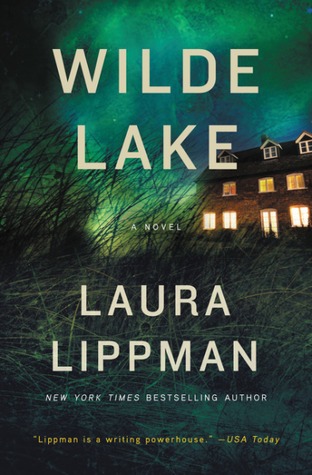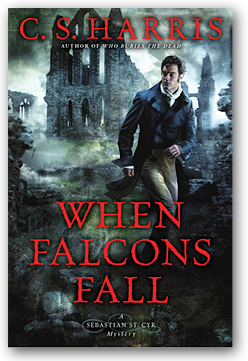The first one I read from first page to last page was Baltimore newspaper journalist turned mystery-thriller novelist, Laura Lippman's latest, Wilde Lake. As have some her other most recent novels, Wilde Lake features a plot that switches between the featured character(s)'s past and present.
This isn't one of her Tess Monaghan series -- the protag's evidently aged out of continuing, or else, Lippman, married to David Simon, has too much else going on to keep up the Tess series for now, as well as continuing her production of non-series works. I have very much enjoyed all of Lippman's novels, not least because they're set in Baltimore and the immediate environs.
The second novel I read from first page to last is also a mystery thriller, though constructed within historical fiction. When Falcons Fall, number 11 and the latest installment in the continuing Sebastian St. Cyre series by C.S. Harris. The tales are temporally located during the Napoleonic era. St. Cyr, Vicount Devlin, is a special Londoner: fabulously handsome, intelligent, high ranking, highly skilled fighting with hands and weapons, possessing enhanced vision and hearing. To offset his entitlements he also carries the weight of what seems the insoluble mystery of his birth father's identity. The young lord is caught up in one murder after another that have political dimensions as well as personal ones. By now he's accompanied on his adventures by his equally high born and talented -- and of course, socially conscious far beyond their time -- wife, Hero. They have an infant son, who is the reason they married in the first place, as the two, who met not cute, but in hate, ended up having desperation sex in the face of their imminent deaths. However, obvs, they neither died, and truly adore each other.
The third novel it looks very like I shall be reading from the first page to last is Guy Gavriel Key's latest, Children of Earth and Sky (unfortunate title) set in a fantasy 16th century fantasy Venice, fantasy Prague and fantasy Ottomans. The little guys are fantasy kingdoms on the fantasy Dalmatian Coast. I started the novel last night, too tired to do anything else, thanks to the Coughing Whatever It Is, and got one third of the way through with no problems (other than usual ones with Kay's fantasy Spanish and other languages) before giving up to sleep. The era and the region are ongoing interests of mine, in any case. Kay also writes strong women, and the varieties of ways in which women can be strong, most effectively, meaning they are still women not men with the mere addition of primary female sexual characteristics. He also has the great gift of keeping one wishing to turn the page.
I'm exceedingly hesitant to believe this, but last night I did have the most sleep I've had in weeks. It was sleep uninterrupted by coughing. I didn't take the drops before bed, and I did take a part of a sleeping aid, for the first time in many weeks. I only needed to take three drops during night, waked by coughing irritation. Normally it's been a lot more often and then I never get back to sleep. So I feel a lot better today than I have in weeks. This is the start of week 5 since I came down with The Coughing.
It's difficult business, writing coherently and accessibly about Thaddeus Stevens, Henry Wilson, Charles Sumner and the so-called Radicals during Andrew Johnson's lies and and the catastrophes he opened for African Americans. The Coughing has made it seem just about impossible to achieve that objective.
This period of American history after Lincoln's assassination is murky at best to anyone who isn't a specialist in the first place, and most histories tend to say very little about any of what happens after Johnson is sworn in as POTUS. This isn't sexy history, but some of the worst of our history, particularly our political racist history, this throwing of the emancipated slaves to the CSA wolves. making it even more complex is that the House and Senate moved on two separate occasions to impeach Andrew Johnson.
Moreover, the reputations of everyone who struggled against the northern and southern white supremacists of the time -- were libeled as "Radicals", including General Grant. These clear-sighted adversaries of white supremacy have been subject during their own lifetimes and ever after to relentless calumny and lies.
 |
| Harper's Weekly woodcut of Stevens making his final argument to the House |
As mentioned, most people, if they recognize the name of Stevens at all do so because of Griffith's portrayal of him as a lascivious man who kept a mulatta mistress (though Stevens, single all his life, did enjoy the company of women and never pretended otherwise, he did not have a mulatta mistress). Sumner is remembered as the man, who in 1856, secessionist Preston Brooks infamously viciously beat nearly to death (Preston did intend to kill him) with a cane in the Senate chambers, and maybe, as a close friend of the Adams's family, particularly Francis Adams, Henry Adams's father. Does anyone know that Henry Wilson existed, though he wrote one of the most useful histories of the Civil War going, writing it while all the events were fresh in his memory?
So, even discounting feeling rotten from The Coughing, the difficulties I'm facing here are great. Please wish me luck in achieving my goal. I need all the good wishes I can get!




No comments:
Post a Comment